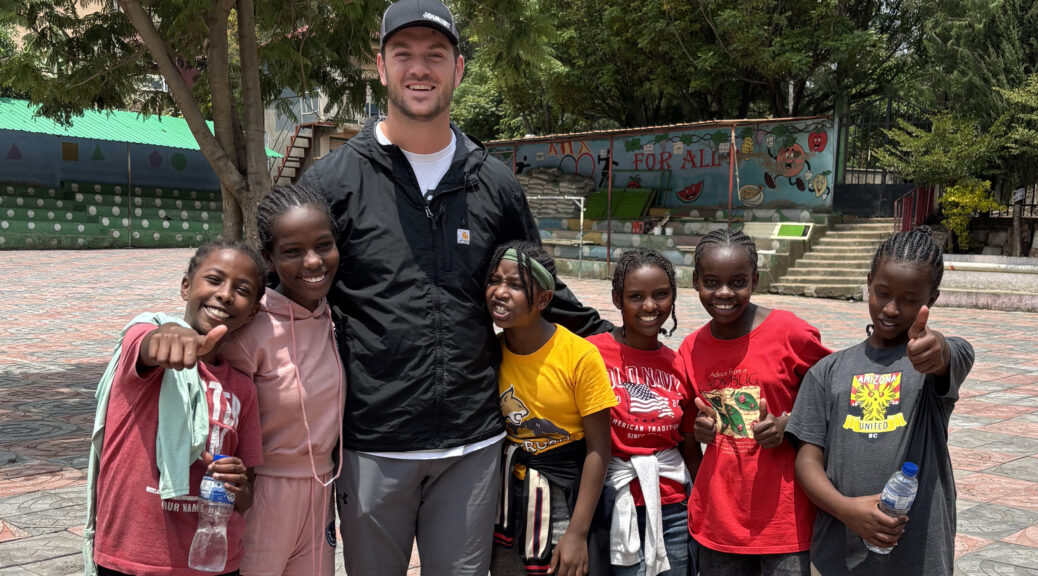
What We Deserve
As I sit in the lobby of the Z Addis Hotel trying to write this blog, what seems like a year’s worth of sights, sounds, and experiences flood my mind. Trying to summarize them is a difficult task – I expect it to be weeks before I’ve fully processed what we’ve seen in Addis Ababa so far, or maybe I never completely will.
Some of the sights have been somewhat comical (at least by American standards), such as three live goats tied to the roof of a sedan, a man standing on a cart being pulled by a horse down the middle of a busy street, or the grill at our hotel being cleaned by a mop that may or may not have just finished cleaning the floor.
Other sights have cut me with sadness, such as human beings living amongst massive vultures in the confines of the city’s massive dump, single mothers lining the streets and begging us for handouts whenever we step out of the car, or a disabled man lying on a mat in a crowd of people in near Biblical fashion.
These types of sights are so common in Addis, that I already feel myself starting to dismiss them, when only a week ago they captivated my full attention.
Amidst this chaotic setting, Bring Love In is attempting to break the cycles that have resulted in so much hurt and brokenness by giving orphaned children loving homes, constant support, and pointing them towards the Lord. Stepping onto their campus for the first time after 1.5 days of roaming Addis, I felt my soul almost sigh with relief as I was greeted by a wave of children that were smiling, laughing, and holding their arms out for big hugs.
Just as bright lights seem so much brighter when they shine in total darkness, the joy of Bring Love In seems so much greater in the midst of the city around it.
A word I’ve been pondering a lot this week is “deserve”. In the United States, we often operate with an underlying assumption that certain actions “deserve” certain results: Criminals deserve punishment. Workers deserve fair pay. Children deserve quality schooling.
When we experience things that go against what we believe we “deserve”, we often become upset or outright angry. However, after my time with both the children and staff of Bring Love In, I can say that I’ve never met a group of people that seems more deserving than they.
The little children live in tiny bedrooms with 3-4 other siblings. Their possessions fit in the boundaries of one closet drawer or suit case, and yet they beam with pride when showing you their things. The older kids care well for their younger siblings, and many now live out their Faith at the universities they are attending. The staff loves on the kids constantly and makes great personal sacrifice in order to support the vision of Bring Love In. We learned that one of the house mothers has children of her own that live in Canada. Still, she has chosen to stay in Addis raising the children of Bring Love In, because she sees it as more important than going to be with her own kids.
When I look at all these incredible examples of Faith, selflessness, and joy in the midst of trial, it’s hard to understand why these children have endured such difficult lives with so little, while I’ve lived in such comfort with so much. From an American standpoint, these wonderful kids seem like they “deserve the world”.
Rattling around in my head are questions like: Why do I have so many possessions, when these kids do not? Why do I have two loving parents, when these kids are without theirs? Why do I have a job that I love, when these kids may struggle to find work in a hurting economy?
Ephesians 2:3 tells us that naturally, none of us is deserving of any of the grace that we have been given. While I knew this theologically, I don’t ever think I’ve ever had to confront the idea of “deserving” as practically as I have this week.
Coming home from Ethiopia, it’s my sincere prayer that I learn to not take for granted the blessings I’ve been given and that I use them to honor God’s kingdom – not seek my own glory. I want to be a man who gives constant thanks for God’s grace in both the small things and the big things in life, because I’ve now experience the gratitude of a community who knows the true value of the Lord’s provision in times of need.
To close, I’m in awe that people of Bozeman, Montana and people of Addis Ababa, Ethiopia worship and have Faith in the same wonderful God, despite our drastic differences in environment and culture. Though half a world apart, we find ourselves headed toward the same eternal destination. What a beautiful thought that one day, we could see the children of Bring Love In again in Heaven.
– Alec